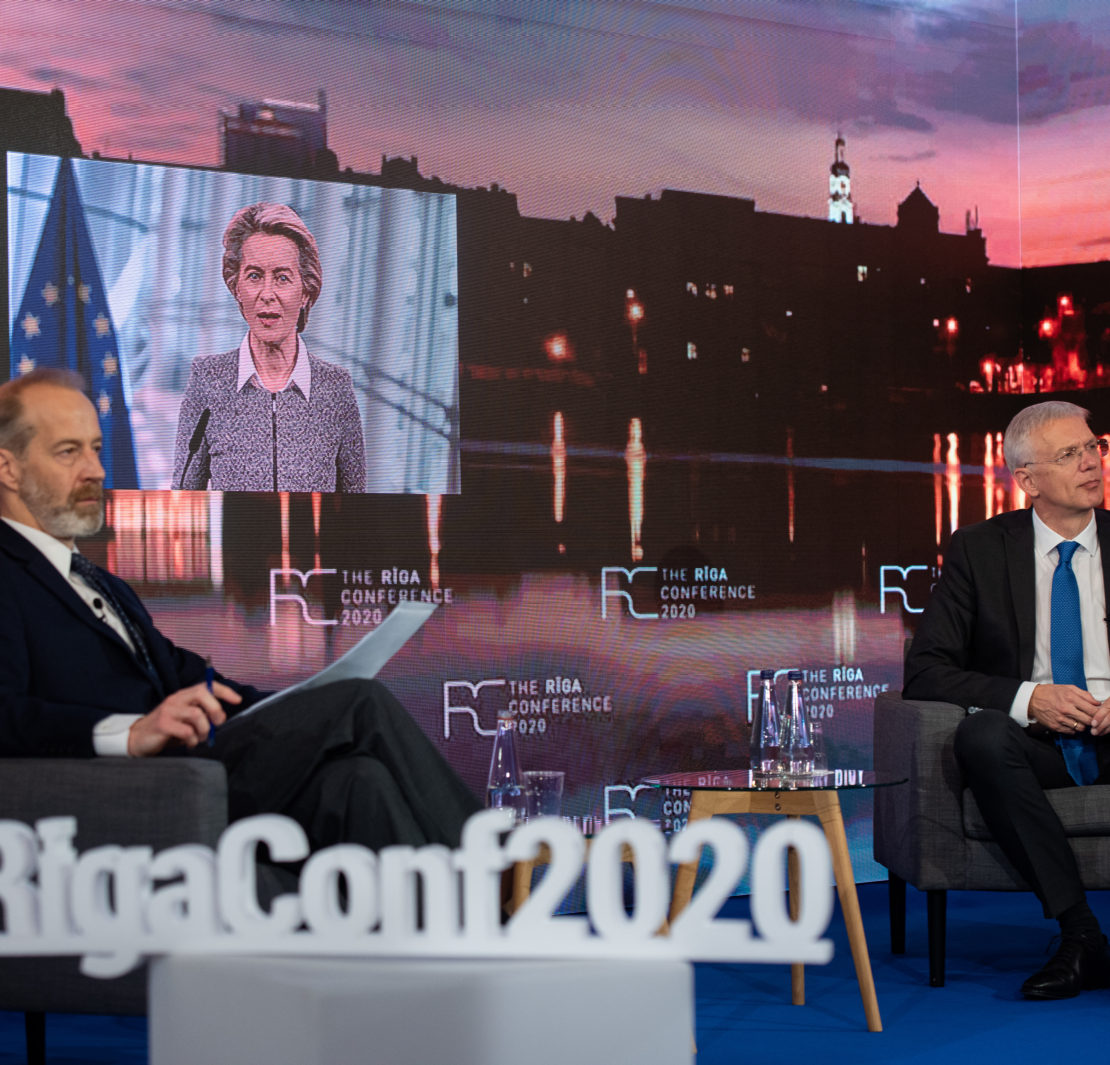Panel Participants:
H.E. Krišjānis Kariņš, Prime minister of the Republic of Latvia
H.E. Jens Stoltenberg, Secretary General of NATO
H.E. Ursula von der Leyen, President of the European Commission
Moderator:
Pauls Raudseps, Journalist, Chairman of the Board of Cits Medijs
The discussion began with welcoming remarks highlighting a vision for NATO in 2030. Three core elements were emphasized. First, NATO must continue investing not only in traditional defensive materiel but build towards new capabilities like cyber-defense. Second, NATO must continue growing into a stronger political alliance. The discussant pointed out, in particular, that NATO is the only place where North America and Europe meets every day to discuss commonalities and differences. Third, NATO must expand its approach to better face global challenges like terrorism, cyber threats, nuclear weapons, and the rise of China. Altogether, it is important that the NATO strategic blueprint is updated going forward to ensure that partners work closely also take new threats into the ambit of collective security. For example, disinformation is a rising threat that requires going beyond the current practice, it is important to ensure strong democratic institutions, a free and independent press, and bolster journalism that can question sources, among other foundations of resilience.
The discussion turned to how the ongoing Covid-19 pandemic has impacted thinking about the future. Though the pandemic has placed increasing pressure on the world and grown tensions – these are short term issues. Ultimately, the pandemic is a stark reminded that regardless of how much risk the West believes there to be – it must prepare for all of them. Over decades, it is increasingly difficult to prove what the next crisis will be.
During Covid-19 the borders were closed between states, which was worrying with regards to the transatlantic alliance’s readiness for other forms of conflict. However, after the first wave the borders were opened. It is vital to keep them open to ensure supply lines are connected. The ongoing crisis has highlighted a lack of willingness to share critical supplies when they should be shared the most. Underlying this issue is the even more serious aspect of a lack of capability to collectively supply members of the alliance. Now that medical supply lines have been resolved, other supply lines should be attended to in case of different – even military – crises. Hence, it must be investigated whether military supply lines, food chains, communications, and other supply chains remain strong under crisis situations.
The next discussant moved the discussion towards the ‘’old discussion” of NATO resilience, noting, that it is always on the agenda, but it needs to be increased in priority status. The last decade has shown the variety of threats and challenges that can challenge the transatlantic society beyond traditional military threats. Building resilience in light of these developments must mean to add to infrastructure and bolster civil society in a tangible way. The baseline requirements for resiliency have been established to include elements like telecoms, health, transportation, and other civil infrastructure. Mostly civilian transport would be used during crises, for example, so these must be functional and capable of being accessed. Similarly, fundamental communications infrastructure like 5g should be established to make sure there are no foreign control systems, as they are vital to the operation of society during times of stability, but especially during crises.
In response to a question from the audience regarding the reconciliation of tensions among NATO members, discussants commented that NATO tensions are nothing new and will continue to exist. Despite the differences between members, they can and have been overcome historically to unite around a core task and core mission – to defend and protect each other. NATO must remain a platform to minimize differences between its members towards these core missions going forward and strive to move beyond them to achieve its goals.
The discussion ended with an exploration of the role of the European Union as a member of the transatlantic alliance. A united stance based on shared values remains the foundation for united efforts going forward. Belarus is the most salient front where the European Union can mobilize these shared values. The speaker proposed a European Union global human rights sanction regime and more strategic approaches to cooperation with third countries going forward. Such initiatives would make it easier to help upcoming democracies and highlight a readiness to mobilize economic clout to oppose dictatorial regimes.

